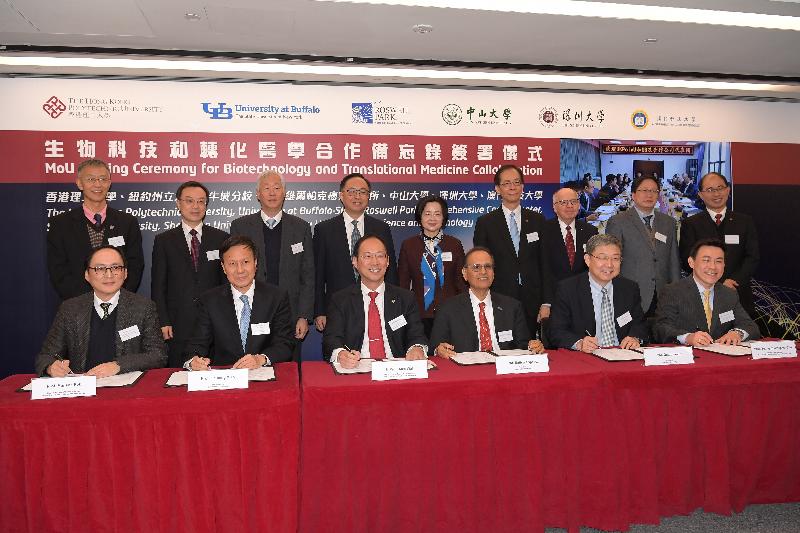
Welcome speech by S for IT at MoU Signing Ceremony for Biotechnology and Translational Medicine Collaboration (English only) (with photo)
Following is the welcome speech by the Secretary for Innovation and Technology, Mr Nicholas W Yang, at the Memorandum of Understanding Signing Ceremony for Biotechnology and Translational Medicine Collaboration today (February 2):
Tim (President of the Hong Kong Polytechnic University (PolyU), Professor Timothy Tong), Alex (Vice President (Research Development) of the PolyU, Professor Alexander Wai), Deputy Director-General Qiu (Deputy Director-General of the Science and Technology Innovation Commission of Shenzhen Municipality Ms Qiu Xuan), Professor Tripathi (President of the University at Buffalo, the State University of New York, the United States (US), Professor Satish Tripathi), distinguished guests, ladies and gentlemen,
Good afternoon.
It gives me great pleasure to welcome you to the signing of the Memorandum of Understanding today between the Hong Kong Polytechnic University and the State University of New York at Buffalo, joined by academic partners from Guangdong and Macao. Today's signing sets a significant milestone for closer research collaboration among the US, Hong Kong, Mainland and Macao.
Innovation and technology has always been a top agenda of the Hong Kong SAR Government. In the 2017 Policy Address, the Chief Executive introduced eight key measures to enhance innovation and technology development in Hong Kong, which includes a substantial increase in R&D resources, a super tax deduction for R&D expenditures and continued expansion of R&D infrastructure. It is also our vision to develop an international innovation and technology hub to capture the unprecedented opportunity under the Guangdong-Hong Kong-Macao Bay Area initiative.
Biotechnology is certainly one of the key technology disciplines in our pursuit to promote innovation and technology, not only because of its prospective economic contribution to diversify and grow our existing industry and business, but also because of its boundless potential to revolutionise disease treatment and to enhance the quality of life.
Over the years, Hong Kong has developed a strong foothold in biotechnology research, including biomedicine. Our medical and healthcare system is world famous for its high quality, reliability and cost-effectiveness. We have two medical schools ranked among the world's 50 best in delivering top quality medical doctors and researchers. With the government's support, there are now two dedicated Phase I clinical trial centres in Hong Kong which will facilitate the adoption of biomedical research outcomes. There are now a total of 16 Partner State Key Laboratories contributing to Hong Kong's cutting edge R&D, with about two-thirds of them conducting biotechnology related research.
To step up our collaboration in innovation and technology with other economies' talent pools, the Government has been attracting internationally renowned R&D institutions and universities to Hong Kong. World-class research institutions, such as Massachusetts Institute of Technology, Karolinska Institutet and the Guangzhou Institute of Biomedicine and Health, have all established a presence here in Hong Kong during the past two years.
With our solid groundwork in biotechnology research, we have successfully translated our novel laboratory discoveries and research results into viable products and services. Two good examples are the non-invasive prenatal diagnostic method pioneered by Professor Dennis Lo, which has now been used in over 90 countries by millions of pregnant women, and the oral arsenic trioxide medicine developed by Professor Kwong Yuk-lam at the University of Hong Kong for blood cancer treatment. Surely you heard of many others, including the ones at the PolyU. These are both globally recognised and locally developed biomedical achievements.
I am very pleased to witness the commitment of the PolyU, the State University of New York at Buffalo, and the Mainland and Macao partner institutions to establish a closer collaboration and ties to leverage on each other's strengths to spearhead translational research in biotechnology. I believe such collaboration is both timely and relevant. I am also confident that this international partnership will drive a new wave of world-class developments in biotechnology.
Thank you very much.
-ENDS-
